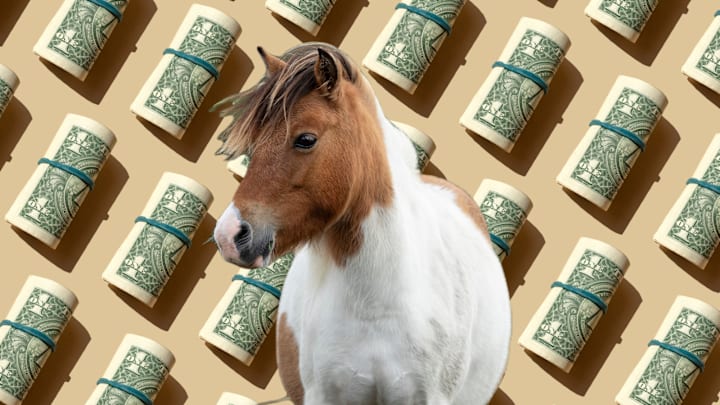If you’ve ever owed someone money, you might have been told to “pony up” the cash, which could be some loose change for a laundromat—or considerably more. “Irish Utility Said to Pony Up $20 Million for Tesla Motors,” read one 2008 New York Times headline. But what exactly do ponies have to do with financial transactions? Were ponies once currency? Not exactly.
The Origin of Pony Up
Green’s Dictionary of Slang defines pony up as “to pay one’s debt or one’s dues” and dates its first printed use back to 1819, when Rural Magazine and Farmer’s Monthly Museum opined that “favoured gentlemen are walking rapidly into the merchant-tailors shops, and very slowly out, unless they ponied up the Spanish [money].”
But the phrase likely came into use well before that. According to Grammarist, the idiom may have roots in the 16th century and is possibly derived from the Latin phrase legem pone found in Psalm 119 of the Bible. Legem pone essentially meant “money down” and was often invoked on March 25, or what was once the first payday of the financial calendar year. The date was when debts were settled, which eventually led to the corruption of the phrase and to make pony up an idiom meaning “give me money.”
While this origin is the most plausible, it’s not the only theory. It’s possible pony up came from the German word poniren, or “to pay.” Pony was also British slang for a small sum of cash (perhaps 25 pounds sterling) in the 19th century, and it’s easy to see how this would have quickly been adopted into a phrase for demanding payment. This is likely the only way the pony (animal) has any real relationship to the term: In British slang, a tiny horse was representative of a tiny amount of money.
In 2008, a Boston Globe column observed that a new slang term for arriving to get loaded was coming into focus: pony up to the bar. It appeared to be an amalgamation of two idioms: pony up and belly up to the bar, the latter a reference to getting close enough to a bar that your stomach touched it. Still, relatively few people say they’re going “to pony up to the bar.”
Ponying Up vs. Coughing Up vs. Paying Through the Nose
Ponying up shouldn’t be conflated with coughing up cash. The latter, which also dates its first use back to the 1800s, generally means “to pay with some reluctance or difficulty.” One may also cough up information, albeit with hesitation. An informant might, for example, cough up a secret.
Another transactional idiom, pay through the nose, has a slightly more colorful history. One theory holds that it comes from some hostility that arose in 9th century Denmark, when Danes supposedly extracted delinquent taxes from the Irish by slitting the nose of deadbeats. More likely, it comes from the word rhino once being a slang term for money; it’s also the Greek word for nose, hence rhinoplasty in plastic surgery. Thanks to insurance limits, one can expect to pony up considerably for such an expensive cosmetic procedure.
Have you got a Big Question you'd like us to answer? If so, let us know by emailing us at bigquestions@mentalfloss.com.
Read More About Some Common Idioms:
